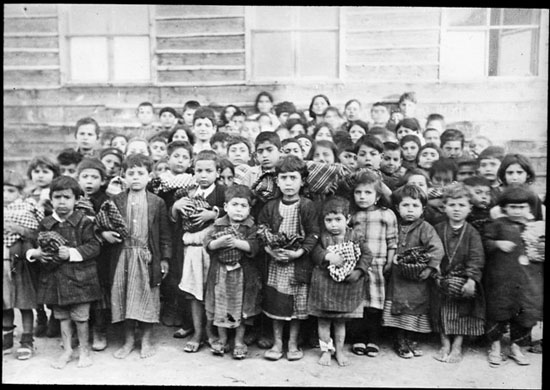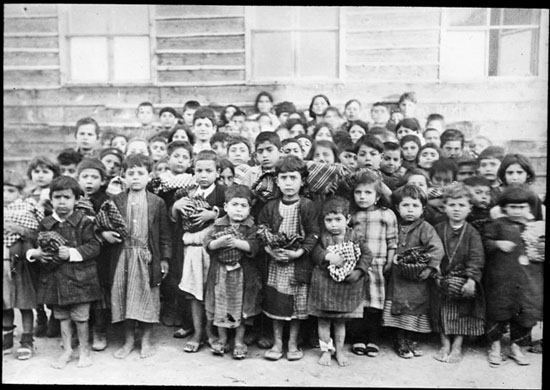Records of Aleppo Rescue Home published in Turkish


Armenian orphans in 1923 at the Aleppo Rescue Home
EMRE CAN DAĞLIOĞLU
[email protected]
The book, comprising records kept from 1922 to 1927 by the Danish missionary Karen Jeppe, who on behalf of the League of Nations founded the Rescue Home, contains the life stories of 1.184 Armenian women and children who took shelter at the refuge. According to Jeppe’s personal note to these records, the number of people she saved during the terms she served as a League of Nations Commissar was approximately 1.700.
469 women, 684 men
The records are from the 12 notebooks held in the United Nations Archive in Geneva, and contain the names of persons who stayed at the refuge, the names of their mother and father if they were able to remember them, their home town, age, the date they arrived at the refuge, and if available, their photographs; and significantly, if they were able to remember, their account of their experience after 1915. According to this data, 469 of the Armenians rescued were women and 684 of them were men. The age scale ranges from 1 to 61, and the highest number of refugees were in the age interval of 15 to 20. According to Tetik and Güneş’s assessment, only 5 of the women who arrived at the Refuge had been subjected to sexual violence, and a total of 18 people had suffered verbal abuse. Around half of those who were rescued were women or children withheld by Turkish, Kurdish or Arabic families. In the book, the number of those abducted is given as 348. Male children were often abducted to be forced to work as shepherds, whereas female children were torn apart from their families to be forced into marriage. Around one third of the children who arrived at the Refuge remembered their family being attacked. The stories in the book reveal that the majority of these people who were separated from their families thought that no Armenians were left after the Genocide, however, when they received the news that “Armenians were gathering in Aleppo” they left everything and fled to Aleppo. Around one third of those who came to the Refuge were in some manner returned to their relatives, the rest either worked at the agricultural colony founded by Jeppe, or, once becoming self-sufficient, left the refuge.
‘Breakwater’
For those who are closely interested in the matter, the records presented in the book are not new. The Turkish translation of the records was to be published within the scope of the project jointly carried out by Taner Akçam, Dicle Akar and Matthias Bjørnlund. We contacted Akçam for his view on the issue, and he stated that this book was published to serve as a ‘breakwater’. Another supervisor of the project, Bjørnlund, believes that this book could be a pre-2015 attempt to prevent these documents to be discussed in the context of Genocide, since in the ‘Introduction’ of the book, “the events of 1915” are described as many Armenians losing their lives during and after the gruelling trip they embarked on as part of their “relocation and settlement”, and the framework of these events is defined as a “tragic period during which all Ottoman citizens suffered”.
The publisher’s initiative
Ahmet Tetik, one of the two editors of the book, stated that he was aware of the aforementioned project, however, he pointed out that they had started working on the records two years ago. Regarding Bjørnlund’s view that the book was published as a “preparation for 2015” he said, “To claim that would be malintent. We deemed these records important since they contained first-hand accounts of the events and therefore we wanted to publish them.” Tetik went on to claim that since the witnesses did not mention a planned massacre it would be impossible to claim that such an event took place, adding that events brought on by the lack of public order during war time had taken place, and that Turks had experienced similar suffering. When we asked him why a book about an institution referred to as the Aleppo Rescue Home in Turkish sources had been titled the ‘Aleppo Shelter’, Tetik stated that the word ‘refuge’ would not have meant anything to the reader, and that the publisher had taken the initiative in choosing this title.



